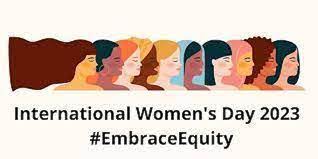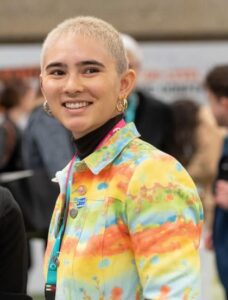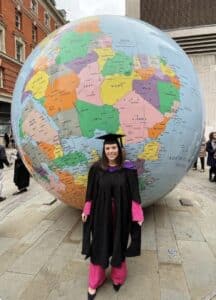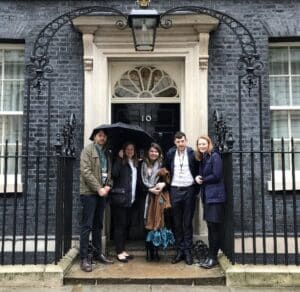Easter Classics Trip 2024
Over the Easter holidays, our students and staff had a successful Classics trip through the heart of Ancient...

We are delighted that alumna, Lily Rosengard (Class of 2013) is joining us, live from New York, on Wednesday 8 March to give an online talk to students, both at Latymer and our partner schools, as part of International Women’s Day 2023. They will be speaking about their work and career to date, from leaving Latymer to addressing the UN last October about youth engagement and the digital gender gap (read more about Lily below).

Wednesday 8 March marks International Women’s Day 2023 and this year’s theme is ‘Embrace Equity”. Since 1975 when the UN officially recognised International Women’s Day, on 8 March every year, people in more than 80 countries worldwide celebrate the social, economic, cultural and political achievements of women.
On the day itself and throughout the week, students and staff are marking International Women’s Day through a series of assemblies, events and activities across lessons and extracurricular clubs and societies. In Sciences they are looking at the role of women in scientific discoveries, talking about ‘Equality vs Equity’ and what this means in Science; students will choose a biologist and write a letter to them stating what they admire about their work and asking questions about the challenges that they have faced. In Modern Languages students are discussing the role of women in those countries from Simone de Beauvoir and Marie Curie to Sophie School. In History, students will test their knowledge about significant women in history in a quiz about ‘mould-breakers’. In Religion and Philosophy students will look at ‘worship of the feminine’ and gender equality in different religions. In Gender, Society and Identity elective students will be discussing “Hidden Figures” as part of their exploration of intersectionality and the overlooked contribution of women in history. In the Library, the IWD debate in the Lords will be live-streamed on the big screens and students will be able submit their questions directly to Baroness Tanni Grey-Thompson.
As a School we also celebrate our incredible alumnae who have gone on into a wide variety of careers, both in UK and around the world, in music and the arts, science, technology, medicine, law, politics and third sector including:
 Lily Rosengard (2013) is the Global Education Policy and Advocacy Specialist at Plan International where Lily focuses on education in emergencies for girls and young women in all their diversity. Plan International is an organisation focusing on advancing children’s rights and equality for girls in more than 75 countries around the world. Recently promoted from their role as Youth Advocacy Officer in its United Nations team, Lily worked directly with young people from around the globe, facilitating their engagement at the United Nations and putting their voices and priorities at the centre of decision-making at all levels of the UN.
Lily Rosengard (2013) is the Global Education Policy and Advocacy Specialist at Plan International where Lily focuses on education in emergencies for girls and young women in all their diversity. Plan International is an organisation focusing on advancing children’s rights and equality for girls in more than 75 countries around the world. Recently promoted from their role as Youth Advocacy Officer in its United Nations team, Lily worked directly with young people from around the globe, facilitating their engagement at the United Nations and putting their voices and priorities at the centre of decision-making at all levels of the UN.
A passionate intersectional feminist, at Trinity Hall, University of Cambridge, they got involved in advocacy and gender equality activism in the role as Women’s Officer. They soon discovered the world of gender policy work and that of non-profits and international NGOs, and went on to do a Masters in Human Rights at UCL. Whilst at university they worked with a gender policy think tank, focusing on gender policy research and the topic of comprehensive sexuality education, and advocated for this to become mandatory in schools. After university they moved to Hanoi, Vietnam to work on a women’s economic empowerment project funded by the Australian government. They then moved back to London to begin their career in the Global Partnerships team at Plan International, connecting with experts on topics from sexual health and reproductive rights, to early childhood development, and girls as active drivers of change. Last year, they changed roles within the organisation and moved to New York to work specifically on United Nations-based youth advocacy across West Africa, East Africa and the Middle East. “One of my proudest moments is when I had the great honour of making an intervention on behalf of Plan International at the UN Headquarters ECOSOC Chamber on how to make youth engagement at the UN more meaningful,” Lily said.
 Emily Hoble (2012) leads Growth for Founders Pledge, a global non-profit that supports tech founders to do the most good possible with their charitable giving.
Emily Hoble (2012) leads Growth for Founders Pledge, a global non-profit that supports tech founders to do the most good possible with their charitable giving.
After leaving Latymer she travelled the world gaining lots of experience in different volunteering roles. In Ghana she worked for an education non–profit. The following summer, she worked for a Bank in Bangladesh getting vital on-the-ground experience of microfinance. As part of her undergraduate degree, she moved to Shanghai where she did an internship for London & Partners, the Mayor of London’s economic development agency. She ended up working for them for five years after graduating, initially as a foreign direct investment specialist, and latterly becoming Head of Corporate Engagement. She then completed an Executive MSc in Social Business and Entrepreneurship at the London School of Economics in 2020/21. It was here that she learnt about a fast-growing movement called effective altruism, which encourages the use of data to determine where resources can be best used to tackle big problems. Much of the work that Founders Pledge does is inspired by effective altruism. The 1,700 members are equipped with everything needed to maximise their impact, from evidence-led research and advice on the world’s most pressing problems, to comprehensive infrastructure for global grant-making, alongside opportunities to learn and connect. To date, members have pledged over $8 billion to charity and donated $800 million. Notable members include founders behind companies like Airbnb, UiPath, FarFetch, Unity and Klarna.
 Alex Davis (2005) lead on rough sleeping health policy during the COVID-19 pandemic. As part of a small taskforce led by Dame Louise Casey, she protected those who rough sleep, saving thousands of lives. “In a single weekend (with limited sleep!) we ensured that thousands of rough sleepers were offered accommodation,” she said. “I joined the civil service around 11 years ago, with little real idea of what I was getting myself into. Several people told me the job description sounded incredibly dull! Fortunately, it turned out to be one of my better decisions, and it has enabled me to work on some extraordinary areas of social policy.”
Alex Davis (2005) lead on rough sleeping health policy during the COVID-19 pandemic. As part of a small taskforce led by Dame Louise Casey, she protected those who rough sleep, saving thousands of lives. “In a single weekend (with limited sleep!) we ensured that thousands of rough sleepers were offered accommodation,” she said. “I joined the civil service around 11 years ago, with little real idea of what I was getting myself into. Several people told me the job description sounded incredibly dull! Fortunately, it turned out to be one of my better decisions, and it has enabled me to work on some extraordinary areas of social policy.”
She first worked on social housing policy, then went to work directly for Ministers as a private secretary before working on the Grenfell Rehousing Programme, homelessness and rough sleeping policy and strategy, and most recently heading up the team working on prison safety and security at the Ministry of Justice. “The thread that runs through all of the roles I have undertaken is that they offer a real chance to make society a bit fairer, to design systems to work more effectively for the most vulnerable, and to ensure that the government of the day gets robust and evidenced advice upon which to make decisions.”
She has recently accepted a new role as Deputy Director to head up the Rape Review and Sexual Violence Policy in the Ministry of Justice and is looking forward to a new challenge.
Over the Easter holidays, our students and staff had a successful Classics trip through the heart of Ancient...
During the Easter holidays, our German department and our students travelled to Hamburg to stay with families as part...
Our Duke of Edinburgh (DofE) participants have successfully completed their practice expeditions for the Bronze, Silver, and Gold awards!...